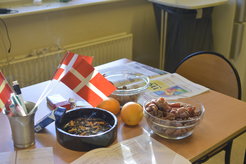Entrepreneurs Against the Market: Morality, hard work and capitalism among small-scale entrepreneurs in Aarhus, Denmark
This research is part of the comparative project REALEURASIA, which investigates small firms, their moral dimensions, and their economic activities across Eurasia. Based on ethnographic fieldwork in Aarhus, Denmark (2015-2017), Berta focuses on small scale entrepreneurs in everyday life, in the firm, at home, and in the local community.

Combined common lunch room and CEO's office in a Aarhusian family firm.
Photo: Anne Erita V. Berta, Aarhus, November 2015.
Denmark is well-known for its successful welfare regime, its Protestant state religion (albeit nowadays highly secularized), and its egalitarianism. The gradual encroachment of a more liberal economic system has been accompanied by measures to protect this small nation against global economic fluctuations. These developments have allowed large oligopolies and monopolies to emerge, affecting the very existence of small scale capitalism.
Taking Max Weber’s hypothesis of the affinity between Protestantism and modern capitalism as her starting point, Berta investigates the relationships between (economic) society, (private and public) moralities, and small-scale entrepreneurial activity. Perceptions of work and market(s), and the value of family relations are central themes. The context includes notions of individual deservingness (evident in the downplaying of inherited wealth), a strong redistributive state (supported by taxes), sameness (as studied elsewhere in Scandinavia by e.g. Gullestad 1984), and the untranslatable Danish concept of hygge. Berta shows that the survival of independent firms and shops in a seemingly hostile economic environment dominated by transnational corporations and franchises is enabled by a specific constellation of historically evolved values.
Source:
Gullestad, Marianne 1984. Kitchen-table society: a case study of the family life and friendships of young working-class mothers in urban Norway. Oslo: Universitetsforlagets.
